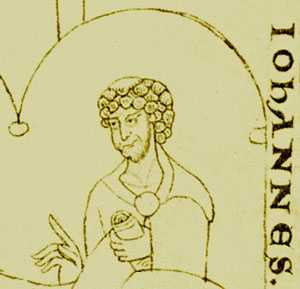„Jakoukoli autoritu, která není potvrzena pravým rozumem, je třeba pokládat za slabou….“
Zdroj: [Benedikt XVI., 2011, Velké postavy středověké církve, 126, 978-80-7195-527-6]
Jan Scotus Eriugena nebo Erigena byl filozof a teolog irského původu, nejvýznamnější myslitel karolinské renesance. Eriugena působil ve Francii na dvoře Karla Holého. Jeho význam spočívá především v další aplikaci novoplatónismu na křesťanské myšlení a v tom, že přeložil do latiny spisy Pseudo-Dionysia Areopagity. Wikipedia

„Jakoukoli autoritu, která není potvrzena pravým rozumem, je třeba pokládat za slabou….“
Zdroj: [Benedikt XVI., 2011, Velké postavy středověké církve, 126, 978-80-7195-527-6]
Irish porridge.
Verdict of the Fourth Council of Valence, 855, on his De Divina Praedestinatione, cited from Ferdinand Christian Baur Die christliche Kirche des Mittelalters in den Haupmomenten ihrer Entwicklung (Tübingen: Fues, 1861) p. 56; translation from Andrew Gibson James Joyce (London: Reaktion, 2006) p. 62.
Criticism
George Bosworth Burch Early Medieval Philosophy (New York: King’s Crown Press, 1951) p. 5.
Of De Divisione Naturae.
Criticism
“No one enters heaven except through philosophy.”
Annotationes in Marciam, no. 64; translation from John Joseph O’Meara Eriugena (Oxford: Clarendon Press, 1988) p. 30.
Originál: (la) Nemo intrat in caelum nisi per philosophiam.
Originál: (la) Tabula tantum.
William of Malmesbury Gesta Pontificum, Bk. 5; translation from Helen Waddell The Wandering Scholars (Harmondsworth: Penguin, [1927] 1954) p. 78.
His reply to Charles the Bald's taunt, as they sat at the same table, "Quid distat inter sottum et Scottum?", (How far is an Irishman from a drunkard?).
Originál: (la) Quid est aliud de philosophia tractare, nisi verae religionis, qua summa et principalis omnium rerum causa, Deus, et humiliter colitur, et rationabiliter investigatur, regulas exponere? Conficitur inde, veram esse philosophiam veram religionem, conversimque veram religionem esse veram philosophiam.
De Divina Praedestinatione, ch. 1; translation from Kenelm Henry Digby Mores Catholici, vol. 8 (London: Booker & Dolman, 1837) p. 198.
Originál: (la) Auctoritas siquidem ex vera ratione processit, ratio vero nequaquam ex auctoritate. Omnis enim auctoritas, quae vera ratione non approbatur, infirma videtur esse. Vera autem ratio, quum virtutibus suis rata atque immutabilis munitur, nullius auctoritatis adstipulatione roborari indigent.
De Divisione Naturae, Bk. 1, ch. 69; translation by I. P. Sheldon-Williams, cited from Peter Dronke (ed.) A History of Twelfth-Century Western Philosophy (Cambridge: CUP, 1988) p. 2.
Originál: (la) Cum ergo audimus, Deum omnia facere, nil aliud debemus intelligere, quam Deum in omnibus esse, hoc est, essentiam omnium subsistere.
De Divisione Naturae, Bk. 1, ch. 72; translation from Hugh Fraser Stewart Boethius: An Essay (London: William Blackwood, 1891) p. 255.
Helen Waddell The Wandering Scholars (Harmondsworth: Penguin, [1927] 1954) pp. 77-78.
Criticism